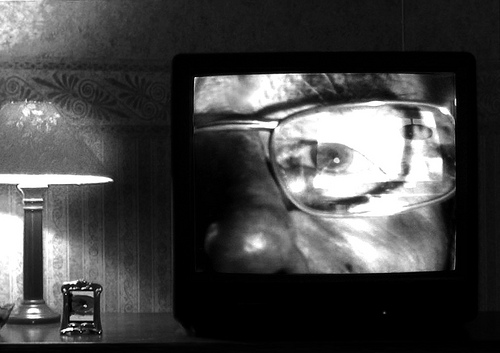This TV will scrutinize your appearance, tone of voice, home decor and your every move.
A lot of people are turned off by the way that Gmail harvests words from your e-mail messages and uses them to decide which ads to show you. Others find it unsettling the way the Kinect for XBOX 360 can detect your movements and translate them into video game form.
Those people have no idea what's coming next.
Verizon has filed a patent for a device that will watch you watching television, and fine-tune the ads accordingly. Let's say that you and your partner start squabbling while watching television: the device might show you ads for marriage counseling. Or if you start cuddling, it might show ads for contraceptives or flowers.
The device will also assess the "physical attributes" of the people watching television. Got long hair? You'll see commercials for conditioner. Overweight? You'll see weight loss ads, and probably fast food ads too. The device will register the tone of your voice, and act accordingly. If you sound stressed, it might show ads for aromatherapy candles or vacation destinations.
It will also be able to scan the room within its field of vision and harvest that data. Got a beer can collection? You'll see ads for beer. Is there a cat present? Cat food ads.
Those aren't hypotheticals: those are all actual examples which Verizon cites in its patent application.
The amazing thing isn't that this patent has been filed. Similar patents have been filed before. Just because you file a patent, it doesn't mean you plan to follow through with it. But this situation is a little different because it's being filed by the country's largest television provider (Verizon), and because we already have all the technology to actually do this. It's just a matter of getting all the pieces to talk to each other, from the facial recognition software to the ad device tailor. This is not a trivial issue, technologically speaking, but it is certainly feasible given today's tech.
Verizon already has the ability to "spy" on people's usage patterns through statistics sent back by DVRs and digital cable receivers. If you record every Downton Abbey episode but never watch it, Verizon knows this. Most people are willing to take the trade-off: their privacy in exchange for digital cable.
However, I suspect that if Verizon tries to market a device like this, they may find more people fleeing the land of television than ever before. Honestly, between Netflix Streaming and Hulu, there's practically no reason to watch television right now anyway. Something like this could really spell the death of broadcast television altogether. (And would that be such a bad thing?)
